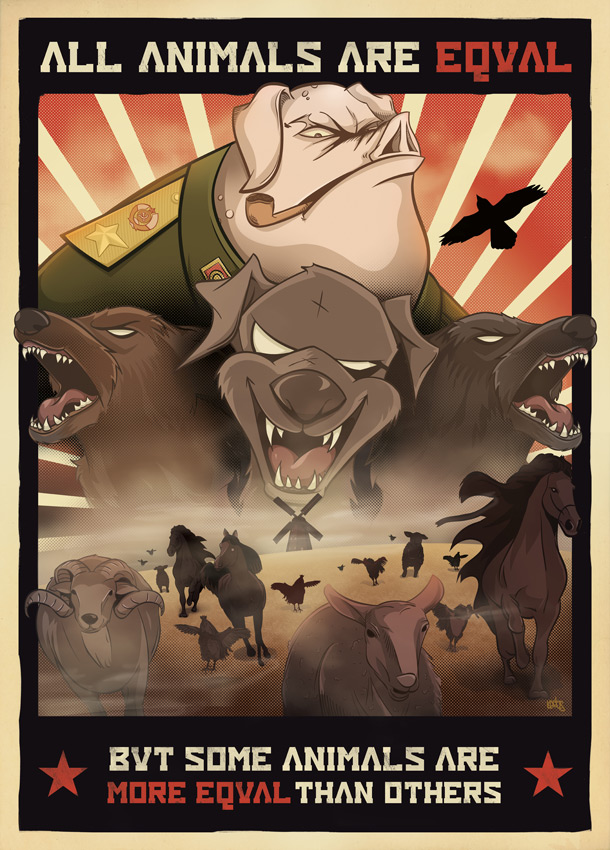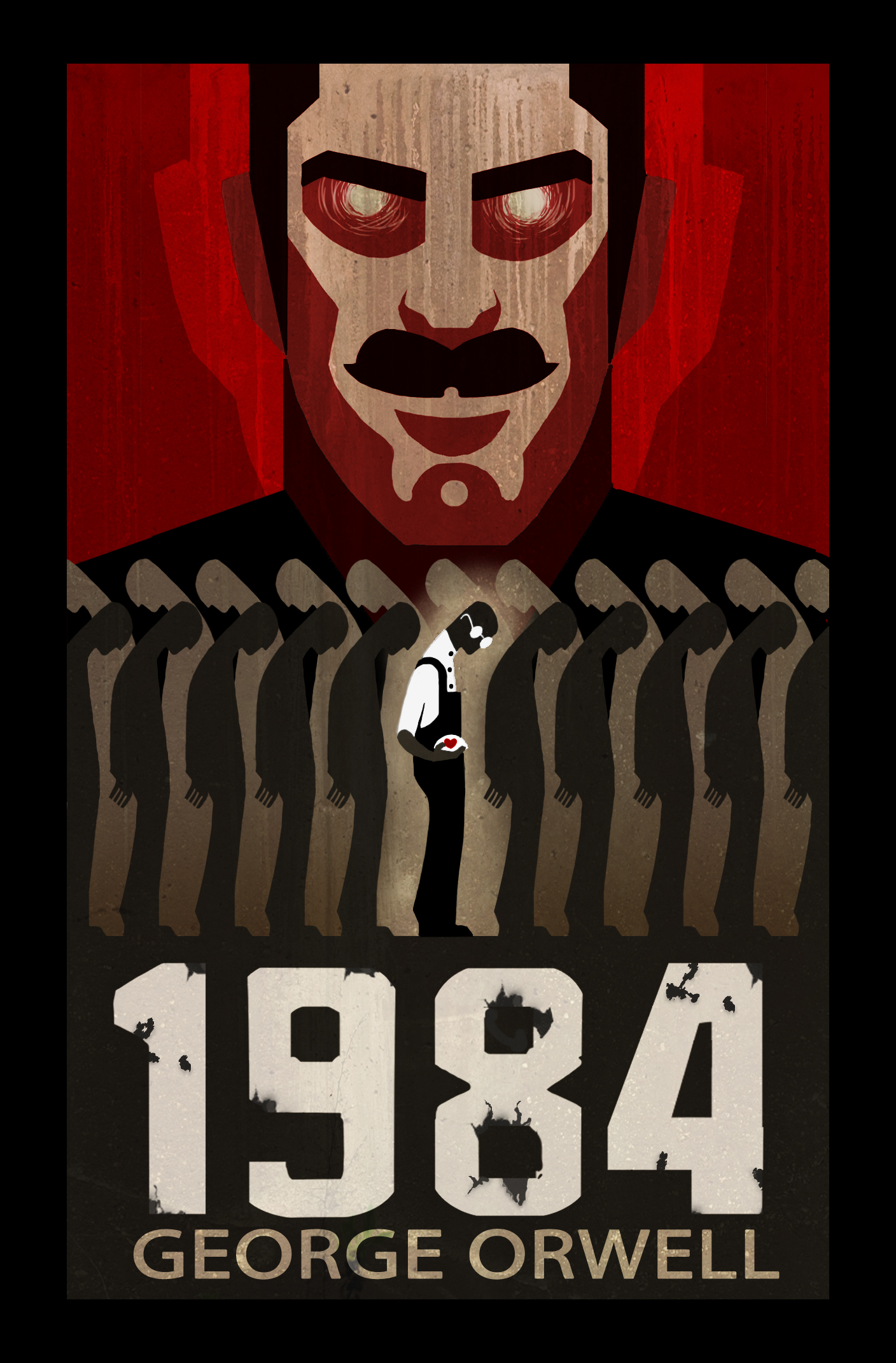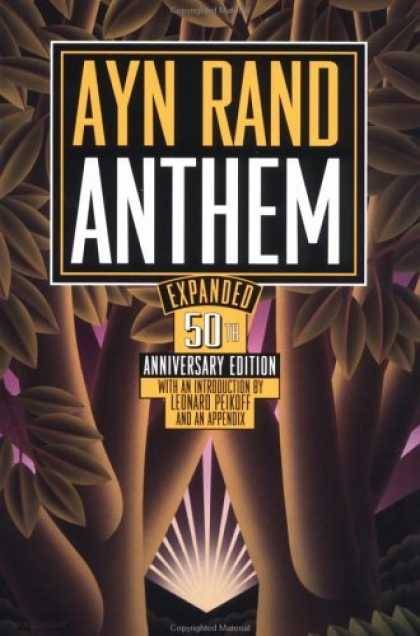-
Authors and the Totalitarism
Hum, well, you see, after wondering if it was much more relevant to put that article here or in The Victorian era for about three seconds, I have finally chosen to write it down here.
Why? Maybe because it's, you now, something like "well, it's talking about authors' involvement with their society, and, that's right, well, there is that too, it will contain some brief literary analysis, so maybe, and I insist on the maybe, it would be more suitable to put it with other actual analysis..." and such ind of internal debates.
If someone come saying "That's a shame! You have to change this imediatly or I'll behead you!" , I'll change it fine, eh, there is no problem. But for now I will just do like I plan to do. If the queen of heart come afterwards, then I'll just bend to her will.
Ah, it seems I was right, I still have my head...
Erm, so, yes, here it is...
Authors and the Totalitarism
And most significantly George Orwell
Well, I'm sure you know, but totalitarism is that awful and disgusting dictatorship like political regime.
Some authors like George Orwell had an eye on it for quite a while, and tried to prevent their own people to fall into the trap of totalitarism, that was the most of the time disguised as an harmless and benevolent polity...
Until the countries that were dispatched around learned that in fact, thousands of innocent people had been slaughtered to keep the regime in place.



George Orwell did realize the threat of these dictatorships in the same time as the other people, with the Third Reich's fall, but he was one of the most clear-sighted when it came to the URSS and the communism pushed to its extremes. He denounciated it by writing 1984 and Animal farm for example.
1984, part 1 chapter 1
The telescreen received and transmitted simultaneously. Any sound that Winston made, above the level of a very low whisper, would be picked up by it, moreover, so long as he remained within the field of vision which the metal plaque commanded, he could be seen as well as heard. There was of course no way of knowing whether you were being watched at any given moment. How often, or on what system, the Thought Police plugged in on any individual wire was guesswork. It was even conceivable that they watched everybody all the time. But at any rate they could plug in your wire whenever they wanted to. You had to live -- did live, from habit that became instinct -- in the assumption that every sound you made was overheard, and, except in darkness, every movement scrutinized.
Yummy, just what you'ld ask for your birthday...
Erm, well, just by looking at these few lines, ... you could say that it's not the world you would dream while you are sleeping.
Words such as "picked up", "scrutinized", denounce the total absenc eof any ind of liberty, and a overall control of the individuals.
The "Thought Police" is just what I'd call a control by terror, with everything that this name implies.
Finally, words just as " simultaneously" or "whenever" made you comprehend that you are dead meat if you dare to make a grin at the telescreen you have not one instant of rest and always have to behave yourself.
1984, part 3 chapter 3
There will be no loyalty, except loyalty toward Big Brother. There will be no love, except the love of Big Brother. There will be no laughter, except the laugh of triumph over a defeated enemy. There will be no art, no literature, no science. There will be no distinction between beauty and ugliness. There will be no curiosity, no enjoyment of the process of life. All competing pleasures will be destroyed. By always - do not forget this, Winston - always there will be the intoxication of power, constantly increasing and constantly growing subtler. Always at every moment, there will be the thrill of victory, the sensation of trampling on an enemy who is helpless. If you want a picture of the future, imagine a boot stamping on a human face - forever.
This is a part of O'Brian's speech about the futur Oceania. Yeepee for the respect of human rights.
Just by reading, it's easy to say that what he means is simply:
*Only what the gouvernment wants is good for its people.
**There is no need of any confidence between two fellows citizens.
***What is good is the diseppearance of cultural and scientist knowledge.
1984, part 2 chapter 9
On the sixth day of Hate Week, after the processions, the speeches, the shouting, the singing, the banners, the posters, the films, the waxworks, the rolling of drums and squealing of trumpets, the tramp of marching feet, the grinding of the caterpillars of tanks, the roar of massed planes, the booming of guns--after six days of this, when the great orgasm was quivering to its climax and the general hatred of Eurasia had boiled up into such delirium that if the crowd could have got their hands on the 2,000 Eurasian war-criminals who were to be publicly hanged on the last day of the proceedings, they would unquestionably have torn them to pieces -- at just this moment it had been announced that Oceania was not after all at war with Eurasia. Oceania was at war with Eastasia. Eurasia was an ally.
It's what leads to politics of fear and propaganda, ain't it? So that there won't ever be rebellions, because people's mind will be kept away from their freedom by the thought of meaningless actions? Well, in short, something like the utlimate destruction of human rights and selfconciousness, right?
Or at least that what I'm thining of when I see such an accumulation of advertisement and military terms as "speeches", "rolling of drums" and "squealing of trumpets" put together with "general hartred" and "delirium", meaning that no one is able to think rationally.
The simple way Orwell put the change of "allies" demonstrates quite efficiently this wretched state of mind: no complicated explanations, only simple word. No liking word, no adjectives that could indicates the author's, or Wilson's, judgement on this sudden change, that is, I forget, not a change. It was always like that, wasn't it? More ou less the same sentences structures, it "as simple as that".
Strange, to say the truth... it looks a lot like the actual North Korea, doesn't it?
Sure it's not just some mirror trick?

Well, here, it's the same thing as for every other matters an authors can try to deal with... you can not totaly eradicate the roots of the evil yeah, it kind of sounds like something serious, just by writing. In fact, you can not eradicate it at all, so by writing a book... Nonetheless, it doesn't mean that what authors like Orwell did is meaningless. I'm just being realistic.
For example, some syrian intellectuals, currently in jail, wrote letters denouncing their country's state.
Aldous Huxley and his Brave New World ( 1932 ) is kind of on the same path as Orwell. The two novels end with such a happy ending that you could go and drown yourself from happyness. But personally I think that kind of book is hilarious.
Ayn Rand wrote Anthem ( 1938 ) where the use of "I" is punishable by death sentence. Looks like a hellish story. I'm sure it would please me.
Ray Bradbury chose to describe a world where knoledge is banned, as its title, Farenheit 451 ( 1954 ), is the temperature where paper burns. A shame. I'll have to behead some of the foolish men who thought it was a good idea...
And at last, The giver ( 1993 ) of Lois Lowry is much more childish. But still, it's not because it's for children that it's not quite right.




-
Commentaires
